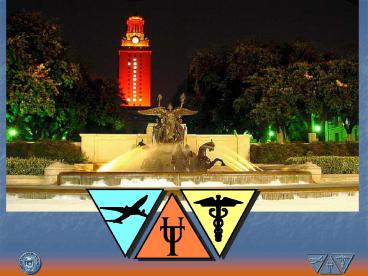Managing Threat and Error in Aviation and Medicine - PowerPoint PPT Presentation
1 / 33
Title:
Managing Threat and Error in Aviation and Medicine
Description:
In both aviation and medicine professionals must deal with technology ... many instances of conflict between surgical and anesthesia teams in the operating room ... – PowerPoint PPT presentation
Number of Views:211
Avg rating:3.0/5.0
Title: Managing Threat and Error in Aviation and Medicine
1
(No Transcript)
2
Managing Threat and ErrorinAviation and Medicine
- Robert Helmreich, PhD, FRAeS
- The University of Texas
- Human Factors Research Project
- College of Liberal Arts Foundation
- Advisory Council
- April 8, 2005
3
University of Texas Human Factors Research Project
- Research into
- Personality and performance
- Individual and team performance
- Human error
- Living in isolation and confinement
- National, organizational, and professional
cultures
4
Threat and Error in Aviation
- Accident investigation
- Flightcrew performance
- Confidential incident reporting system
- Selection
- Personality and performance
5
- Astronaut Selection
- Research
- Personality and performance
6
Healthcare Research
- University of Texas Center of Excellence in
Patient Safety Research - Incident reporting
- Team behavior
- Professional culture of MDs
- Human error in the Intensive Care Unit
- Analysis of videotaped resuscitations
7
Healthcare Research
- Safety is primary goal
- But cost drives decisions
- Technological innovation
- Multiple sources of threat
- Second guessing after disaster
- Air crashes
- Sentinel events (patient death)
- Teamwork is essential
8
Why Teamwork Matters
- Most endeavors in medicine, science, and industry
require groups to work together effectively --
teamwork - Failures of teamwork in complex organizations can
have deadly effects - More than 2/3 of air crashes involve human error,
especially failures in teamwork - Professional training focuses on technical, not
interpersonal, skills
9
Getting surgeons, anesthesiologists, and nurses
to work as a team is like herding cats
10
(No Transcript)
11
What Determines Team Performance and Team Error
- Individual knowledge and skill
- Organizational characteristics
- Team composition
- Culture
12
The Importance of Culture
- Culture is the values, beliefs, and behaviors
that we share with other members of groups - Culture binds us together as a group
- Culture provides cues and clues on how to behave
in normal and novel situations - Culture is a factor in accidents and incidents in
aviation and medicine
13
Cultures Consequences
- Culture influences how juniors relate to their
seniors - Unwillingness to speak up vs. assertive
- Culture influences how information is shared
- Use of direct versus indirect speech
- Culture influences attitudes regarding stress and
personal capabilities - Culture influences adherence to rules
- Culture influences interaction with computers and
technology
14
Organizational Culture and Safety
- Investigation of air crashes shows poor
organizational culture to be a precursor of
disaster - Lack of safety concerns
- Operational pressures
- Poor leadership
- Conflict with management
- Negative organizational climate
- Morale/job satisfaction
15
Threats to Safety in Medicine
Threats are events and errors outside the
individual or team that require active management
for safety
16
Threats to Safety in Medicine
Organizational Organizational Culture Scheduling
Staffing Experience levels Work Load Error
policy Equipment issues
System - level National culture Health-care
policy and regulation Payment modalities Medical
coverage
Professional Proficiency Fatigue Motivation Cultur
e (Invulnerability)
Patient Primary illness Secondary illness Risk
Factors Atypical response to treatment Ongoing
management
Expected Events and Risks Unexpected Events and
Risks
17
Error
18
44,000-98,000 deaths/year due to medical error-
Institute Of Medicine Report
19
Error is Inevitable Because of Human Limitations
- Limited memory capacity
- Limited mental processing capacity
- Negative effects of stress
- Tunnel vision
- Negative influence of fatigue and other
physiological factors - Error is the downside of having a brain
20
- In both aviation and medicine professionals must
deal with technology
21
(No Transcript)
22
Newer technology doesnt eliminate error
23
(No Transcript)
24
Problems at the Interface Between Teams
- We have observed many instances of conflict
between surgical and anesthesia teams in the
operating room
25
(No Transcript)
26
Error
27
(No Transcript)
28
(No Transcript)
29
Antidotes toThreat and ErrorHow can we improve
team performance?
30
Building a Safety Culture What Organizations Can
Do
- Define a clear policy regarding human error
- Accept error but not intentional non-compliance
- Institute formal procedures where appropriate
- Recognize the dangers in fatigue
- Use protected confidential reporting systems to
uncover threats - Analyze events using threat and error template
- Provide formal training in threat and error
management - Make personality a critical factor in selection
and qualification of frontline staff
31
Does Research Make a Difference?
- Airlines have made changes in operations and
procedures and introduced new training based on
findings - Hospitals have initiated confidential reporting
systems and are giving training based on aviation
findings and research into team error - UT personality constellations used in selection
for safety-critical professions
32
Our research team
- Michelle Harper
- Chris Henry
- Major Tom Hughes, PhD
- James Klinect
- Ashleigh Merritt, PhD
- Lou Montgomery
- John Wilhelm
- Undergraduate honors students
33
- The University of Texas
- Human Factors Research Project
- www.psy.utexas.edu/HumanFactors































